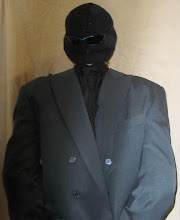This is the Third part in my discussion of the consequences of the some song lyrics that I found interesting. Click here to recap on the introduction and Click here for Yesterday's discussion. Today we move on to a second seemingly obvious consequence of these words - Your Fears Are Not A Definite Truth.
Like Yesterday, this comes fairly easily from the song. In fact, it was so clearly, I mentioned it in the first part. Assumption 2 states "[Truth and Fear] will sometimes conflict. Otherwise only one would be required." Fair enough, but what is the consequence of this assumption. There are a couple.
Firstly, DON'T LISTEN TO YOUR FEARS. They may well not be truth. I wouldn't go so far as to say that they are in this case lies, merely misdirections, possibly unrealised.
The side assumption that we made for corollary b was that Fear is irrational (yes this will still be discussed later, maybe in about a week). Do you trust everything that is told to you be anyone in hysterics? Do you trust anything that is told to you by a lunatic? Before you answer, remember that a person in hysterics will do two things; 1, they will lower their inhibitions - that's almost what the definition of hysterics is - and so they are more likely to be saying everything that they think, truth or not. Secondly, because of this, they are more likely to tell the truth, or what they perceive the truth to be. Now how do you answer. Perceptions can be right, but they can also be wrong and so you have to take it with a grain of salt.
What about loonies? Before you answer this one, remember that lunatics (even though I dislike the word I'm going to keep using it) have less filters on the way that they see. This gives them a less polarised view on what they see compared to you. Yes that's right, walnuts are saner than you and even almonds, the nuttiest of nuts, can make a fairly good play. And remember that the filters that they lack may be the ones that cancel paranoia so they may be extra paranoid, or it may be the complete opposite.
With this side assumption we can say that Fear will just say what ever pops into his head, whether he is right or wrong and he will either lack the intelligence to decide which is which or the willpower to shut up when he knows he is wrong.
Secondly, if Fear has the loudest voice (corollary a) then he will be the one who is easier to listen to. Again obvious (he is 3dB louder) but this means that what I just said is harder. It isn't impossible, it's just more difficult. We know this, in a loud room it's harder to hear a quiet voice, even if it's right in front of you and it's easier to just sit and catch snatches of all of the conversation that's happening.
Thirdly, we have a problem. We can't use a polygraph test to test Fear, because he thinks he is telling the truth.
Yes this is a real problem, because even though your fears aren't truth they are at some level plausible. Which makes your job harder again (in case it wasn't hard enough yet)
Once again I don't have any hard and fast rules for this, and in this case I don't even have any real guide lines that you can apply. Really all I can say is to feel out the situation before you believe what's happening.
Watch this space again tomorrow.
Wednesday, June 9, 2010
Subscribe to:
Post Comments (Atom)

No comments:
Post a Comment